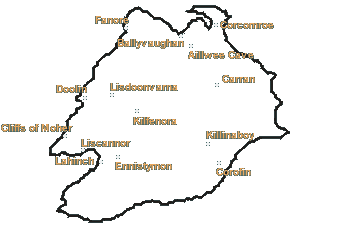
|


Aran Islands
Clearly visible from the mainland, these stunningly beautiful islands have
preserved the Gealic traditions and customs to this day.
The smallest of the 3 islands, Inisheer, is only 10 km from the mainland.
There are ferry services out of Doolin and Liscannor.
Doolin
 Is a small fishing village on a sandy bay some 3km from the Cliffs of
Moher. It is a place of great beauty and tranquillity and a paradise for geologists, botanists, ornithologists, speleologists and walkers.
Doolin is famous for its wealth of Irish folk music and festivals,
the village also offers good angling. Is a small fishing village on a sandy bay some 3km from the Cliffs of
Moher. It is a place of great beauty and tranquillity and a paradise for geologists, botanists, ornithologists, speleologists and walkers.
Doolin is famous for its wealth of Irish folk music and festivals,
the village also offers good angling.
There are delightful beaches, but the beach to the south of the pier is
extremely dangerous for intending bathers.
 Doonagore Castle is a short distance away. The castle is an unusual structure
consisting of a circular tower in a small bawn (walled enclosure). It has
recently been restored. Doonagore Castle is a short distance away. The castle is an unusual structure
consisting of a circular tower in a small bawn (walled enclosure). It has
recently been restored.
Between Doolin and Lisdoonvarna there are numerous interesting caves: Poll
an Eidhneain (Ivy cave) is said to contain Europe's longest sialactite.
The region to the north contains numerous cahers or stone ring forts and
earth forts (raths) surrounded by ditches.
 Ballynalackan Castle, 5 km to the north of the village, is a reasonably
well preserved 15th century O'Brien tower house with walled enclosure or
bawn. Its location, on a low rock-cliff overlooking the road affords
magnificent views of land and sea alike. Ballynalackan Castle, 5 km to the north of the village, is a reasonably
well preserved 15th century O'Brien tower house with walled enclosure or
bawn. Its location, on a low rock-cliff overlooking the road affords
magnificent views of land and sea alike.
Ballynalackan
To the south of the village is an upland area of great interest, scattered with
 Stone-forts, megalithic tombs remains of ancient churches.
Stone-forts, megalithic tombs remains of ancient churches.
Slieve Elva, to the north, is the highest mountain in the Burren standing at
318 m. The summit affords a clear view of the extraordinary Burren landscape
as it rises, tier upon tier of limestone.
Fanore
(Fán Óir - golden slope of beach)
With its pleasant beach and broad sand dunes, Fanore is a popular place for bathers.
At the point where the Caher River reaches the sea, sandhills, known as the Rabbit
Warren, stretch out northward. The site of an ancient (middle stone age?) house has
been excavated on the north bank.
 Black Head (Ceann Bóirne - Burren headland) 4 km away has an automated lighthouse
and a climb up the limestone mountain to Caherdooneerish,(Cathair Duin Irghuis -
Fort of Irghus, the legenday builder), rewards you with breathtaking views of
Galway Bay, the Connemara Mountains and the the Aran Islands. Black Head (Ceann Bóirne - Burren headland) 4 km away has an automated lighthouse
and a climb up the limestone mountain to Caherdooneerish,(Cathair Duin Irghuis -
Fort of Irghus, the legenday builder), rewards you with breathtaking views of
Galway Bay, the Connemara Mountains and the the Aran Islands.
Gleninagh Castle, 4.5 Km away, is a 16th century tower house occupied until
about 1840 by the O'Loghlen family, chieftains of the Burren. To the East of
the castle is a fulacht fiadh, or ancient cooking place.
Ballyvaughan
(Baile Ui Bheachain Behan's or Vaughan's town)
 A picturesque sea-side village
nestled between the Burren Mountains and Galway Bay.The village offers excellent sea
fishing, entertainments and craft workshops. Bishop's Quarter beach, 1.5 km away, is an
excellent bathing spot and is noted for the wide variety of shells. A picturesque sea-side village
nestled between the Burren Mountains and Galway Bay.The village offers excellent sea
fishing, entertainments and craft workshops. Bishop's Quarter beach, 1.5 km away, is an
excellent bathing spot and is noted for the wide variety of shells.
The town grew up in the l9th century round the harbour, which was thriving
commercially until recent times. The harbour is now used for pleasure crafts
and as a starting point for boat trips to the Aran Islands.
Gregan Castle is an occupied squat tower house part dated from the 13th century,
which was originally owed by the chief of the Loughlens, Prince of the Burren.
Up until the end of the 16th century Burren was known as the Barony of Gregans.
There are 10 acres of tranquil woodlands in the grounds.
 Newtown Castle, 2 km along the road to Lisdoonvarna is a curious circular tower
house rising from a square "pyramidal" base. Built in the 16th century the
castle passed from the O'Briens to the O'Loghlens. Newtown Castle, 2 km along the road to Lisdoonvarna is a curious circular tower
house rising from a square "pyramidal" base. Built in the 16th century the
castle passed from the O'Briens to the O'Loghlens.
Aillwee Cave, one of the most popular attractions in Co. Clare,
has over 1000 feet of passages with three main chambers.
Rathborney (Rath Bóirne- Burren earth fort) is 3km away in the Feenagh Valley.
There is a medieval church on the site.
  
|
|
















|

